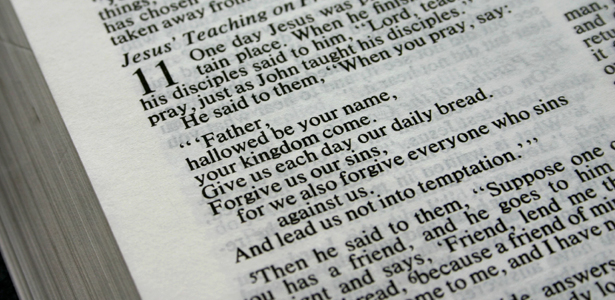“Now Jesus was praying in a certain place, and when he finished, one of his disciples said to him, “Lord, teach us to pray, as John taught his disciples.” And he said to them, ‘When you pray, say:
Father, hallowed be your name.
Your kingdom come.
Give us each day our daily bread,
and forgive us our sins,
for we ourselves forgive everyone who is indebted to us.
And lead us not into temptation.’” Luke 11:1-4
If we have been in church for more than a few years, we know the Lord’s Prayer by heart and often recite it by rote. It is one prayer that transcends all of Christendom from Catholics, to Protestants to the Orthodox church and everything in between.
In Luke 11, the disciples ask Jesus, “Lord, teach us to pray.” They have been traveling with Jesus for some time and they’ve watched Jesus withdraw to deserted places to pray. They’ve witnessed Jesus pray over the sick and the lame for healing. As devout Jewish men, the disciples have been praying all of their lives, but this way that Jesus prays is much more intimate than anything they would have experienced before. Jesus has a close and cherished relationship with his Father God, the very Creator of the Universe, and the disciples also long for that connection. So Jesus offers them a model, for how to intimately relate to their Father God through prayer.
Our Father who is in Heaven, hallowed, holy, honored be your name.
What follows this introduction are three commands. On the surface these commands seem almost brazen; how can we be ordering God around? Give us! Forgive us! Lead us! Is Jesus really modeling for us that it is ok to command God? Actually yes, because the commands highlight our desperate need of God.
It is out of our utter dependence on God that we can ask, “give us this day our daily bread.” Just as a child runs in the house after playing outside and yells, “Mom, what’s for dinner?”, we can also trust that God’s provision is dependable. Most children don’t wonder if they will get dinner – they know that Mom or Dad will have their nutritional needs taken care of. Can we learn to live each day in utter dependence on God? To go to him with a childlike faith that says, I know that you will provide for all of my needs and I don’t have to worry one little bit? When we ask God to “give us our daily bread”, we are admitting to ourselves, and to God, that we are living our lives depending and trusting in his provision.
It is out of our guilt and remorse that we ask God to “forgive us our debts, our sins and our transgressions.” If we don’t have some semblance of consciousness of our failings, then we would have no need to ask God for forgiveness. It is again out of our dependence on God that we ask for His forgiveness. But notice that this forgiveness comes with an awareness on our part that God is also requiring something from us. We are asking God to forgive us, as we also forgive others.
Jesus so beautifully illustrates this in the parable of the unmerciful servant in Matthew 18. The King cancels the debt of one of his servants, a debt that would take more than a lifetime for this servant to repay. The freed servant on the other hand is not willing to forgive a much smaller debt owed to him by a fellow servant. Upon hearing of this, the King recalls the servant and reprimands him saying, “I canceled all that debt of yours because you begged me to. Shouldn’t you have had mercy on your fellow servant just as I had on you?”
“Forgive us our sins, for we also forgive everyone who sins against us.” Praying this is a dangerous act if we take it seriously!
It is out of our sense of vulnerability that we ask God to “lead us”. Lead us Lord, but not into temptation. I am too weak to resist, so I trust that you will guide my paths around those activities that prove too enticing, or attractive or seductive. Temptation can look sinister, like drugs and alcohol and sex. Temptation can also look more innocuous, like a chocolate cupcake, mindless television, “harmless” gossip, or trashy novels. We all have different vulnerabilities, and God is faithful to direct our lives if we are willing to relinquish control. However, at various times in my life, when things are difficult or tumultuous, I realize that I try to control my life instead. God, ever gentle as he is, has allowed me to do so, until I realize what I’ve done, and find life to be much more exciting and satisfying if I leave the leading to God.
For everyone who has trusted Jesus as their Lord and Savior, we can all learn to pray like Jesus did. God is patiently waiting for each one of us to engage him in an intimate relationship through prayer.
Thy will be done, on earth, right here, as it is in heaven.
Read an earlier post by Amy here.
Related Articles

What the Bible Says About Honoring Your Parents: Five Truths We Learn from the Fifth Commandment

What Does Worship Mean in the Bible

What Role Does Humility Play in Obedience? Learning from the Life of Saul/Paul

The Way to New Life

The Gift of God’s Faithfulness

The Gift of God’s Comfort

Bible Study Hacks: Making Scripture Come Alive

What Does Faith Mean in Our Daily Life?


